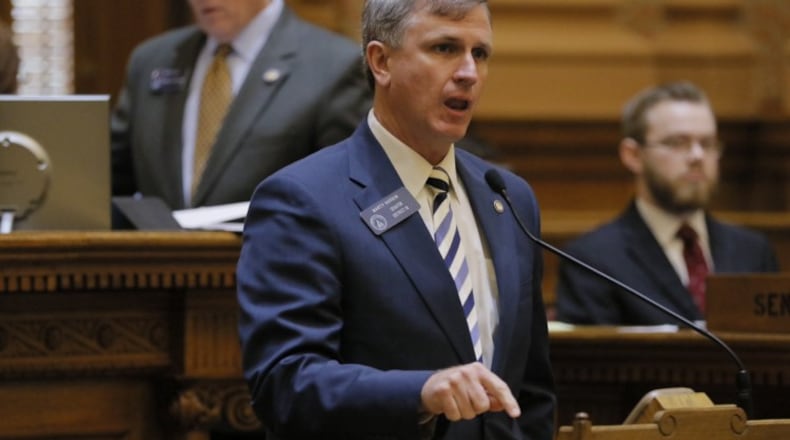State senators are renewing a perennial effort to give stronger legal protections to religious Georgians, filing a “religious liberty” bill that its supporters hope could become law now that Republican Gov. Brian Kemp is in office.
The legislation sparked an immediate backlash from critics, including gay rights groups and powerful business boosters, who promised to defeat the bill because they say it could be used to discriminate. The proposal would limit the government’s ability to pass laws that conflict with religious beliefs.
But religious groups say they’re threatened by overzealous governments that could pass laws infringing on their beliefs.
"Georgians need to be fully protected under the First Amendment," said state Sen. Marty Harbin, a Republican from Tyrone who introduced Senate Bill 221 on Wednesday. "I don't see it as a discriminatory issue at all. You could be from that community and have your religious rights violated, and it would protect you."
Business leaders, including Home Depot co-founder Arthur Blank, quickly spoke up to try to stop the bill. Blank, the owner of the Atlanta Falcons and Atlanta United, said in an interview Thursday that Georgia shouldn’t jeopardize its strong track record for business growth.
“I think anything that we do that interferes with that is not a positive thing for Georgia,” he said.
Then-Gov. Nathan Deal vetoed a religious liberty bill in 2016 after dozens of companies, including Apple, Time Warner and the Walt Disney Co., threatened boycotts. He said at the time that he viewed it as discriminatory.
Supporters of the religious rights bill hope it could become law now that Kemp is Georgia’s governor.
Kemp said during his campaign last year that he would only sign a "mirror image"of a federal religious freedom law passed in 1993.
"Anything else, I'll veto it," Kemp said in August.
The bill filed this week includes the same language as the federal Religious Freedom Restoration Act, but it also includes provisions that would allow plaintiffs who win lawsuits against the government to recover their legal costs in religious cases. Another addition to the bill spells out that judges would be able to order governments to change their laws and practices deemed to infringe on religious beliefs, but it would bar monetary damages.
Echoing other supporters, Harbin counters that more than a dozen states have enacted religious rights laws over the past two decades, including Virginia, where Amazon is building part of its new second headquarters.
And in a display of the measure’s popularity among grassroots conservatives, Harbin’s measure attracted nine Republican co-sponsors, including seven Senate chairmen.
“This is not about discrimination against anybody. It’s a protection,” said Mike Griffin, a lobbyist for the Georgia Baptist Convention. “There are situations where we believe Christians are being targeted in some way. And it’s not just about Christians. It’s about all people of faith.”
Still, the bill faces an uncertain future. House Speaker David Ralston has been an outspoken critic of the legislation since Deal’s veto, and it’s not immediately clear whether Lt. Gov. Geoff Duncan will let it come to a vote in the Senate.
Kemp, meanwhile, declined to comment on the legislation after a press conference at the Capitol.
The bill’s opponents wasted no time in mounting a campaign to make sure it doesn’t pass the Senate before a key legislative deadline next week. They worried it could plunge Georgia into a damaging debate that will cripple efforts to recruit new corporate jobs.
“Here we go again,” said Jeff Graham of Georgia Equality, a gay rights group. “Extremist lawmakers seem prepared to put us in a negative national spotlight yet again, risking Georgia’s economic reputation and putting LGBT people in harm’s way.”
The Metro Atlanta Chamber and the Georgia Chamber issued a joint statement calling the measure a distraction away from more important issues, such as workforce development and transportation.
“While there’s no new evidence to suggest this legislation is needed,” they said, “there is plentiful data other states have suffered and will continue to suffer long-term economic harm for enacting a law that many see as discriminatory.”
Keep Reading
The Latest
Featured





